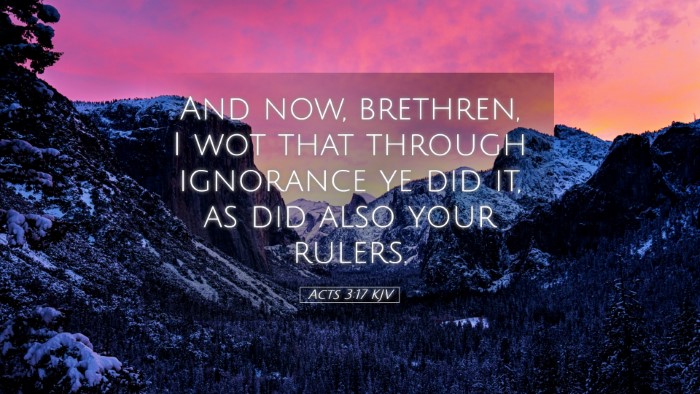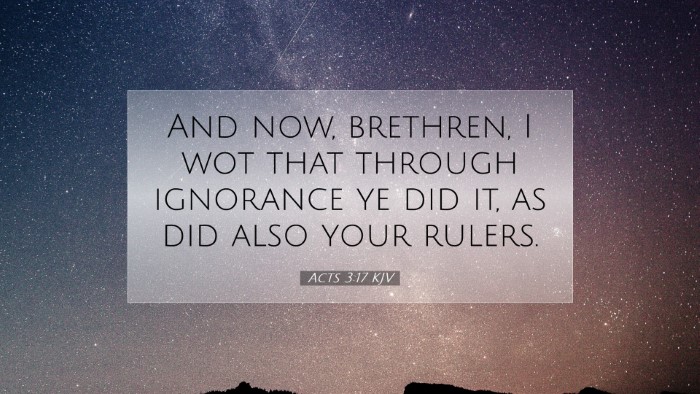Old Testament
Genesis Exodus Leviticus Numbers Deuteronomy Joshua Judges Ruth 1 Samuel 2 Samuel 1 Kings 2 Kings 1 Chronicles 2 Chronicles Ezra Nehemiah Esther Job Psalms Proverbs Ecclesiastes Song of Solomon Isaiah Jeremiah Lamentations Ezekiel Daniel Hosea Joel Amos Obadiah Jonah Micah Nahum Habakkuk Zephaniah Haggai Zechariah MalachiActs 3:17
Acts 3:17 KJV
And now, brethren, I wot that through ignorance ye did it, as did also your rulers.
Acts 3:17 Bible Commentary
Commentary on Acts 3:17
Verse Reference: Acts 3:17 - "And now, brethren, I wot that through ignorance ye did it, as did also your rulers."
Introduction
This verse occurs in the context of Peter's sermon following the miraculous healing of the lame man at the Beautiful Gate. Having drawn attention to this miracle, Peter now addresses the crowd, illustrating their culpability while simultaneously extending grace through truth. This serves as a foundational moment for understanding the dynamics of sin, repentance, and divine mercy in Christian theology.
Contextual Analysis
The apostle Peter speaks directly to the Jewish audience, emphasizing that their actions—betraying and crucifying Jesus—were done in ignorance. It is crucial to recognize that while they acted out of ignorance, this does not absolve them of guilt, as the lack of knowledge does not negate the responsibility of their actions.
Public Domain Commentary Insights
Matthew Henry
Matthew Henry emphasizes the importance of recognizing ignorance in the context of sin. He notes that ignorance is not a justification for wrongdoing; rather, it highlights the need for enlightenment and spiritual awakening. Henry points out that the Jewish leaders, despite their influential positions, acted without true understanding of Jesus' identity and mission. This lack of insight underscores the necessity of both divine revelation and personal responsibility:
- Ignorance and Responsibility: Peter’s declaration serves to remind the audience that ignorance does not exempt one from liability before God.
- Divine Mercy: Henry illustrates God’s readiness to forgive those who repent, even if their sin was committed in ignorance.
- Call to Repentance: The acknowledgment of ignorance paves the way for a heartfelt response to the gospel’s call to repentance.
Albert Barnes
Albert Barnes expands on the concept of ignorance as presented in this verse, articulating how it relates to the broader Christian narrative of salvation:
- Culpability vs. Ignorance: Barnes argues that ignorance is a common state for humanity, yet it does not negate the truth that all have sinned and fall short of the glory of God (Romans 3:23).
- Hope for the Ignorant: He points to how this ignorance can be a stepping stone to faith, suggesting that those who are unaware of their guilt are called to seek knowledge, leading to repentance and restoration.
- Old Testament Insights: Barnes draws parallels with Old Testament passages emphasizing the consequences of ignorance (Hosea 4:6), further deepening the understanding of sin's nature and its remedy through Christ.
Adam Clarke
Adam Clarke provides an insightful theological lens through which to view the dynamics of ignorance and guilt. He highlights several key aspects:
- Nature of Ignorance: Clarke discusses how ignorance is a product of an unregenerate heart, lacking the illumination of the Holy Spirit.
- The Role of Preaching: He emphasizes the transformative power of preaching the gospel, as Peter does here, to awaken the ignorance of the heart, thus igniting a longing for knowledge of God.
- Urgency of Repentance: Clarke stresses the necessity of responding to the call of repentance urgently, for ignorance can lead to destruction if left unchecked.
Theological Implications
This verse raises profound theological questions regarding the nature of sin, ignorance, and the grace of God:
- Soteriological Insight: The reality of sin committed in ignorance offers a complex view of soteriology—one where the acknowledgment of our ignorance before God can lead to profound transformation through Christ.
- The Divine Response to Ignorance: Acts 3:17 exemplifies God’s tendency to respond to human failure with opportunities for redemption, indicating that even in our ignorance, God seeks to reconcile us to Himself.
- Outreach to Seekers: For pastors and evangelists, this verse serves as a reminder that many in our communities may be unaware of their spiritual condition, creating a compelling case for outreach and education through faithful preaching.
Conclusion
Acts 3:17 remains a potent reminder of the fine balance between human responsibility and divine mercy. As believers, we are called to embrace the truth of our ignorance, seek knowledge, and repent, reminding others of the hope available in Jesus Christ. This verse encapsulates the urgency of the gospel message and challenges all who read it to reflect deeply on their relationship with God, the nature of their sins, and the depth of His grace.


